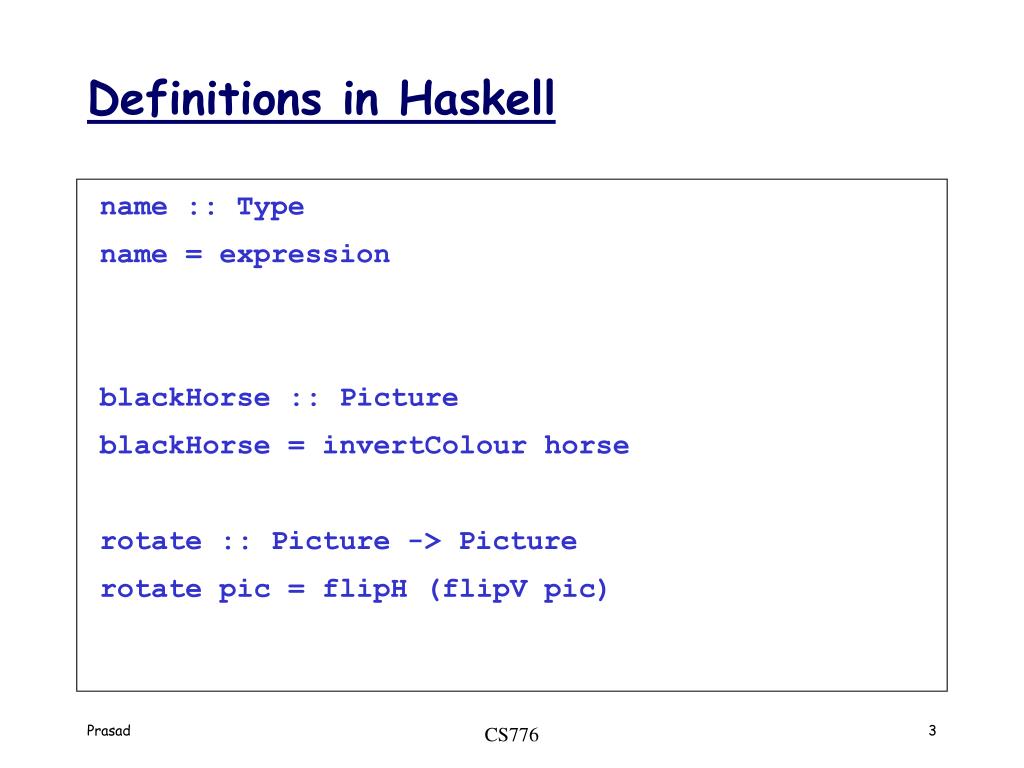

Here, there are totally different concepts having the same names. By the end of this article you would know that the similarities with OOP are very few and squinted. Though the notions of class and polymorphism bring into mind the object oriented programming, remember that Haskell is different. We continue to uncover features of this language in this article by giving a short insight into another type system characteristic: the special way in which polymorphism is implemented in Haskell: typeclasses. class Eq a where ( = ) :: a -> a -> Bool ( /= ) :: a -> a -> Bool x = y = not ( x /= y ) x /= y = not ( x = y ) - This defines a typeclass that requires two functions, (=) and (/=) - It also declares that one function can be declared in terms of another - So it is enough that *either* the (=) function or the (/=) is defined - And the other will be 'filled in' based on the typeclass definition - To make a type a member of a type class, the instance keyword is used instance Eq TrafficLight where Red = Red = True Green = Green = True Yellow = Yellow = True _ = _ = False - Now we can use (=) and (/=) with TrafficLight objects canProceedThrough :: TrafficLight -> Bool canProceedThrough t = t /= Red - You can NOT create an instance definition for a type synonym - Functions can be written to take typeclasses with type parameters, - rather than types, assuming that the function only relies on - features of the typeclass isEqual ( Eq a ) => a -> a -> Bool isEqual x y = x = y - Note that x and y MUST be the same type, as they are both defined - as being of type parameter 'a'.In the last article we offered a short review of Haskell types, both the existing ones and the ones which can be defined by the programmer.

The Eq typeclass is for types whose instances can - be tested for equality with one another. Typeclasses - Typeclasses are one way Haskell does polymorphism - They are similar to interfaces in other languages - A typeclass defines a set of functions that must - work on any type that is in that typeclass. Say we have the - following type synonyms and items with the following type signatures type Weight = Float type Height = Float type Point = ( Float, Float ) getMyHeightAndWeight :: Person -> ( Height, Weight ) findCenter :: Circle -> Point somePerson :: Person someCircle :: Circle distance :: Point -> Point -> Float - The following would compile and run without issue, - even though it does not make sense semantically, - because the type synonyms reduce to the same base types distance ( getMyHeightAndWeight somePerson ) ( findCenter someCircle ) - 8. This is fine: myPoint'2 = CartesianPoint2D 3.3 4.0 - It's also useful to pattern match data constructors in `case` expressions distanceFromOrigin x = case x of ( CartesianPoint2D x y ) -> sqrt $ x ** 2 + y ** 2 ( PolarPoint2D r _ ) -> r - Your data types can have type parameters too: data Maybe a = Nothing | Just a - These are all of type Maybe Just "hello" - of type `Maybe String` Just 1 - of type `Maybe Int` Nothing - of type `Maybe a` for any `a` - For convenience we can also create type synonyms with the 'type' keyword type String = - Unlike `data` types, type synonyms need no constructor, and can be used - anywhere a synonymous data type could be used. Even if a type is defined with record syntax, it can be declared like - a simple data constructor.

Single line comments start with two dashes.


 0 kommentar(er)
0 kommentar(er)
